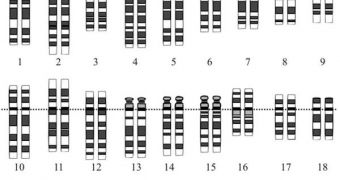Aneuploidy is a very common genetic accident in human fetuses, which occurs when an excessively large number of chromosomes is formed. The results of this genetic malfunction include common genetic disorders (such as the Down Syndrome), as well as pregnancy loss in the most extreme cases. A new study by the US Department Of Energy's (DOE) Lawrence Berkeley National Laboratory (LBNL) has recently shed some light on what precisely causes the many chromosomes to form.
Working together with colleagues from the University of Tennessee in Knoxville, scientists at LBNL's Life Sciences Division observed pregnant mice females, and noticed something peculiar. If the mother's egg had just one mutation in a single copy of the Bub1 gene, then that mouse gave birth to fewer live offspring than others in a control group, which exhibited no such mutation. The find is remarkable, because basic genetics shows that, in order for an organism to be compromised, both copies of a gene in a chromosome need to be mutated in exactly the same manner.
“But we found that a mutation in a single copy of the Bub1 gene can have an impact – and this is not the case with most genes. With Bub1, if you have one bad gene and one healthy gene, there's a problem,” LBNL Life Sciences Division expert Francesco Marchetti, one of the main investigators in the new research, explains. He cooperated closely with University of Tennessee colleague Sundaresan Venkatachalam on a new paper detailing the finds, published in the week of July 13th's advanced online issue of the journal Proceedings of the National Academy of Sciences (PNAS).
“This means that having only one mutated Bub1 gene could be a significant predisposing factor for passing on an abnormal number of chromosomes to offspring,” the expert adds. “We found that, in female mice, a single copy of an abnormal Bub1 gene is sufficient to produce aneuploidy, and this risk increases with age. Our work may help explain how aneuploidy occurs in humans, and why the risk for the condition increases with a mother's age,” Marchetti concludes.

 14 DAY TRIAL //
14 DAY TRIAL //